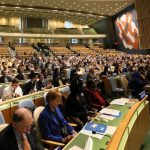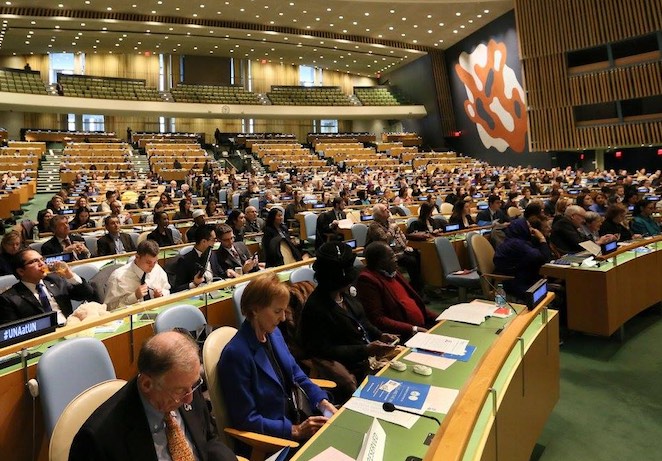‘The US and the UN: New leaders and pressing challenges of today’
The United Nations is an intergovernmental organization that promotes international cooperation. The United Nations Association of the United States of America is one of 16 branches under the Better World Campaign overseen by the United Nations Foundation. It is best described as “advocates for action to educate and empower citizens about the United Nations.”
On Feb. 17, the USA branch hosted its annual Members’ Day at its headquarters in New York. The event was titled: “The U.S. and the U.N.: New leaders, pressing challenges.”
Rachel Bowen Pittman, senior director of membership and programs at the U.N., said “Members’ Day at the U.N. is one of the most important gatherings for UNA-USA during the year, and is a great opportunity for members to network with fellow U.N. supporters from around the country and hear from top U.N. voices.”
The general assembly hall was filled with roughly around 1,200 diplomats, students and general citizens from various parts of the world where various dynamic, informative discussions and panels were conducted throughout the day.
Jeanne Betsock Stillman, conference committee chair of the UNA-USA National Council and developer of the innovative program “Peace Makes the World A Better Place,” brought the call to order for the day’s programs, while Chris Whatley, who serves as executive director of the United Nations Association of the United States, gave the opening remarks.
“We believe, as Americans, that our connections to this planet, to its people(s), to the nations that represents those peoples and to the one institution that connect them all together — I believe that those connections, those threads that weave the world together make us stronger.
We are a movement defined by what we stand for, now what we stand against,” Whatley said.
Peter Yeo, president of the Better World Campaign and vice president for public policy and advocacy at the U.N., disclosed that “America’s relationship with the U.N. is on the rocks,” and that members of the administration are working to defund the U.N.
The keynote speaker, Ambassador Jeffrey D. Feltman, who has assumed the post of undersecretary general for political affairs — and who was appointed by Secretary-General Ban Ki-moon — spoke to the general assembly, conveying that the secretary general “has a clear plan to invigorate the world.” He disclosed that this was a “time of turmoil around the world,” and even questioned the general body of participants whether the U.N. today is fit for purpose with the theme “New Leaders, Pressing Challenges” and called to attention the future of the U.S.-U.N. relationship following recent leadership changes in the United States and at the United Nations.
Informative panels were conducted where distinguished speakers and field workers educated participants on everything from climate action, peacekeeping, gender equality, human rights, conflict resolution, and sustainable development, to global health and the present refugee crisis.Three panelists on each topic introduced their work, highlighted important facts about the necessity of their jobs in present times, and explained their functions within the U.N. framework. Panelists included:
RACHEL SNOW:
Branch chief of population and development in the technical division of the United Nations Population Fund. Leads the fund’s work on strengthening national population data systems and the greater use of demographic intelligence in development. Lead a discussion on gender equality and emphasized that there is a disconnect across the world and a common ground needs to bedeveloped, especially in developing countries.
JUAN CHEBLY:
Serves at the United Nations Environment Programme as lead adviser on partnerships and outreach to the U.N. assistant secretary general, and as the head of the U.N. Environment Management Group. In 2009 he founded Voipebox.com — a telecom startup introducing innovative and pioneering VOIP telephone solutions in South America and the U.S.
In 2010, at age 24, Chebly became the youngest professor of the Peter J. Tobin College of Business at St. John’s University in New York.
JOHN ROMANO:
Coordinator of the Transparency, Accountability & Participation Network, where he guides a network of over 260 civil society organizations that are working on implementing the Sustainable Development Goals of 2016 and accountability for the 2030 agenda. Romano emphasized the need for justice and peace against violence and to bring action to the voices we raise. He encouraged the “mobilization of self to make our voices heard,” along with being transparent and being proactive and engaged.
KAMAL AMAKRANE:
Director of the office of the president of the 71st session of the United Nations General Assembly, Amakrane handles special responsibilities for refugee and migrant issues. Amakrane conveyed how the story of migrants is not a fruitful story. He spoke of the need of a new social fabric in regards to the refugee crisis.
“You cannot wait and sit around for the process to be handed to you, you have to get up and do it yourself for it took the U.N. nearly 71 years to recognize this is a problem. But it is not a crisis of refugees. It is a crisis of compassion, cooperation, and collaboration … and how collectively are we willing to come together.”
Hamdia Ahmed: Present college sophomore at the University of Southern Maine and former refugee in Kenya — born under a plastic shelter sheet provided by the U.N., Ahmed spoke of her experiences during the war between the clans.
“In the past two years I have been learning about trauma response and learning how to heal in order to be healthy, safe, and fulfill my dreams. This has been extremely exhausting, but the safer and healthier I become the more I realize how much I need to heal for myself, my future family, and to be able to truly inspire and help others along their path.”
In between the panels there was a Phone2Action “advocacy ask,” where participants were encouraged to contact their members of Congress and U.S. Ambassador to the U.N. Nikky Haley in regards to help fund the U.N. and support the refugees, and maintain strong U.S.-U.N. relations.
Afternoon keynote speaker Kathy Calvin — president and CEO of the United Nations Foundation — emphasized the need to advocate for the U.N. and the creation of public-private partnerships. Closing remarks were made by Teta Banks, chair of the UNA-USA Natiwonal Council.
In summary, the conference was a unique opportunity to gain insight into the U.N. and gave attendees access to a diverse set of people and topics.






